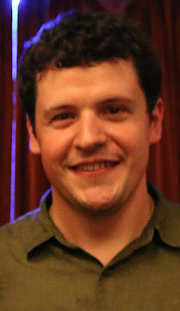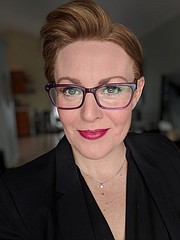Explanation with exclamation
By MAUREEN DOLAN
Staff Writer
COEUR d’ALENE — The battle over Medicaid expansion in Idaho rages on, and the two Idaho groups most firmly entrenched against one another in the fight, Reclaim Idaho and the Idaho Freedom Foundation, remain at the forefront of the debate.
Brent Regan, chairman of the Kootenai County Republican Central Committee and an Idaho Freedom Foundation board member, has criticized Reclaim Idaho for its continued characterization of itself as “grassroots.”
Reclaim Idaho was launched in Sandpoint in the summer of 2017. It was founded by three people, including Luke Mayville, who helped lead the effort that collected thousands of signatures across the state to qualify an initiative to expand Medicaid for the ballot last November. Idaho voters approved the initiative, with 61 percent in favor of Medicaid expansion.
Regan says it is disingenuous for Reclaim Idaho to say it is “grassroots,” meaning an organization is powered by “the people” from the bottom up. According to Regan, Reclaim Idaho’s sponsor is the Fairness Project, a Washington, D.C.-based nonprofit that since 2016 has backed progressive ballot measures in multiple states, and won 16 of them, including Idaho’s Medicaid expansion effort.
The project was founded in 2015 with a $5 million grant from the Service Employees International Union-United Healthcare Workers West, in California, and according to Regan, the Fairness Project is a “front” for a “corrupt California union.”
“The organizations that assisted Reclaim did so because Reclaim’s efforts furthered their objectives. Idaho voters deserve to know what those objectives are,” Regan said.
But Regan’s description of Reclaim Idaho as something other than a locally driven, people-powered effort is false, said the organization’s co-founder Luke Mayville and Rebecca Schroeder, its executive director.
“Reclaim Idaho has never taken a penny of financial support from the Fairness Project or the union which Mr. Regan says is supporting us,” Schroeder said.
There is, however, a strong connection between the Fairness Project and the union. The union’s leader, Dave Regan, no relation to Brent Regan, said during the union’s executive board meeting last September that the SEIU-UHW is the Fairness Project’s largest funder.
“The Fairness Project is the result of this Board, and UHW has provided $11M to FP in last 2 years, $16M total,” said Dave Regan, according to the meeting minutes. “This has produced $5.5B in better wages to 8 million people.”
The meeting minutes also shed some light on the union’s motives for providing such significant funding to an organization whose main mission is to influence ballot initiatives in other states.
“Part of what we need to do is regular people need to win. Regular workers who don’t have unions don’t get to have the voice that workers who do have, don’t get to have the experience of winning. We are privileged that we can get into key offices,” Dave Regan said. “(Brett) Kavanaugh confirmation (to the U.S. Supreme Court) will likely cement anti-union for decades. We have to figure out how to win in ways that are not subject to Supreme Court decisions. We need a workers’ organization.”
In 2017, Dave Regan told the board that ballot measures are a tool to exert union strength in bargaining.
While considering in September whether to loan the Fairness Project $3 million to complete its campaigns throughout the U.S., one of the union’s executive board members asked Dave Regan how the Fairness Project’s Medicaid expansion campaigns help the union in California.
Dave Regan pointed to Maine, an earlier Medicaid Expansion win for the Fairness Project.
“Hospitals now have improved funding, that can be spent on better wages, safety, staffing,” Dave Regan said. “Benefiting the entire industry starting with Medicaid expansion.”
Those same meeting minutes note that Dave Regan said the union received $500,000 from the George Soros Open Societies Project to continue its Fairness Project work.
“It is not credible to claim that a California labor union president, backed by George Soros, cares about Idaho’s Medicaid population so much that he spends over half a million dollars collecting signatures,” Brent Regan said.
He noted, in his opinion piece, that Rebecca Schroeder traveled to California to speak at a union meeting in June.
Schroeder, who was a Reclaim Idaho volunteer at the time and not employed by the organization, said that detail was one of the only accurate statements Brent Regan made.
According to the minutes of the union meeting Schroeder spoke at, she was described as “fighting to expand Medicaid in Idaho on behalf of her son, Brady, who has cystic fibrosis,” whose insurance company is billed more than $30,000 per month for one medication.
“I did travel to talk about my experience,” Schroeder said. “It’s a group that works on working people’s issues. I spent one night there. I spoke to a number of different groups about the ballot initiative.”
Mayville does not deny there was a relationship between Reclaim Idaho and the project, but he reiterated that Reclaim Idaho received no financial support from the Fairness Project.
“It is true that the Fairness Project was one of many partners in the effort to expand Medicaid in Idaho,” said Mayville to The Press. “There were a number of groups that worked alongside Reclaim Idaho to qualify Medicaid expansion for the ballot and to win the election campaign. The bottom line is that Reclaim Idaho filed the initiative and did the vast majority of work to qualify that initiative for the ballot.”
Brent Regan wrote in an opinion piece published last week in this paper that Idaho campaign finance disclosures show the Fairness Project spent about $547,000 for paid signature gatherers to help get Prop 2 on the ballot.
Mayville said he was aware of the expenditures by the Fairness Project, but again noted that Reclaim Idaho never received any of the funds.
The expenditures do not appear on Reclaim Idaho’s campaign expense reports filed with the state elections office, but expenses of $522,000 paid by the Fairness Project to Fieldworks, LLC were filed as independent expenditures in support of the measure, Medicaid expansion. Fieldworks is a Washington, D.C.-based company that offers various supports for political campaigns, including signature-gathering.
“I was well aware that the Fairness Project was hiring paid petitioners to collect signatures,” Mayville said. “We were expecting them to collect a significant number of signatures, but all along we were committed to collecting signatures from our volunteer organization as if it was only us.”
Reclaim Idaho says it collected 96 percent of the signatures.
All told, Reclaim volunteers reportedly collected 54,000 signatures, and the paid collectors from Fieldworks collected at least 2,192 signatures to put the process over the top.
Mayville said $500,000 is a relatively small amount to spend on a signature campaign. It’s not surprising, he said, that paid signature collectors were less effective than Reclaim Idaho’s volunteers.
“When you collect signatures with paid petitioners it’s far less efficient,” Mayville said. “That’s because so many of our volunteers were committed to the issue and very well-trained. They probably worked longer hours, had more experience and they weren’t being paid by the hour.”
Mayville said Reclaim Idaho volunteers are still at work.
“We believe that the ballot initiative is one of the most important levers of accountability that we have in Idaho,” Mayville said. “We’ve been working really hard in the last few weeks to ensure that our constitutional right to organize ballot initiatives remains protected.”
He said Reclaim Idaho does anticipate launching future ballot initiative campaigns.
The Fairness Project has provided support for initiatives in other states to raise the minimum wage and regulate payday lending, but Mayville said Reclaim Idaho does not, at the moment, have any concrete plans to take on those issues.






